unit 3
- 格式:doc
- 大小:79.50 KB
- 文档页数:7
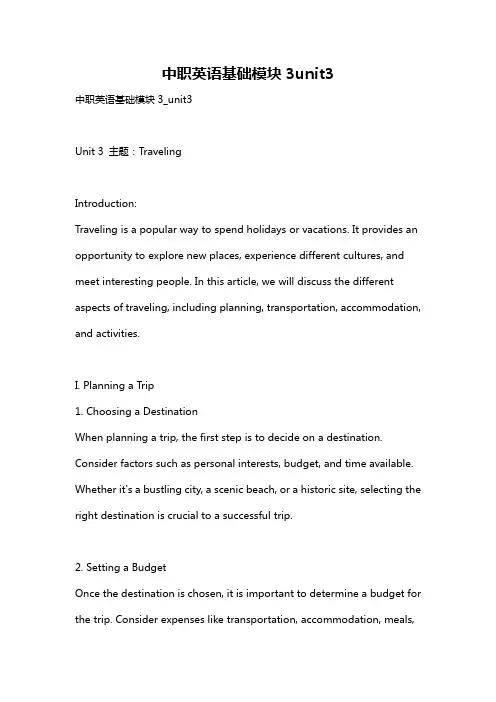
中职英语基础模块3unit3中职英语基础模块3_unit3Unit 3 主题:TravelingIntroduction:Traveling is a popular way to spend holidays or vacations. It provides an opportunity to explore new places, experience different cultures, and meet interesting people. In this article, we will discuss the different aspects of traveling, including planning, transportation, accommodation, and activities.I. Planning a Trip1. Choosing a DestinationWhen planning a trip, the first step is to decide on a destination. Consider factors such as personal interests, budget, and time available. Whether it's a bustling city, a scenic beach, or a historic site, selecting the right destination is crucial to a successful trip.2. Setting a BudgetOnce the destination is chosen, it is important to determine a budget for the trip. Consider expenses like transportation, accommodation, meals,activities, and souvenirs. Research the cost of living in the destination to ensure the budget is realistic.3. Researching the DestinationTo make the most of a trip, research the destination beforehand. Learn about local customs, traditions, and attractions. Find out about any necessary travel documents, vaccinations, or safety precautions. Knowing these details will enhance the overall travel experience.II. Transportation Options1. Choosing a Mode of TransportationAfter determining the destination, one must decide on the best mode of transportation. Consider factors such as distance, budget, speed, and convenience. Options may include traveling by plane, train, bus, or car.2. Booking TicketsOnce the mode of transportation is selected, it is important to book tickets in advance to secure the best deals. Various online platforms and travel agencies offer discounted fares, so comparing prices and booking early can save money.III. Accommodation Choices1. Selecting the Right AccommodationWhen it comes to choosing accommodation, there are several options available. Hotels, hostels, guesthouses, and vacation rentals are some common choices. Consider factors such as location, price, amenities, and reviews when making a decision.2. Making ReservationsAfter deciding on the type of accommodation, it is advisable to make reservations in advance, especially during peak travel seasons. This ensures availability and prevents last-minute stress or disappointment.IV. Activities and Sightseeing1. Planning ActivitiesBefore embarking on a trip, plan a list of activities and sights to see. Research popular attractions, museums, parks, and landmarks in the destination. Include both must-visit sites and off-the-beaten-path experiences to get a well-rounded travel experience.2. Exploring the DestinationOnce at the destination, explore the surroundings and immerse in the local culture. Take guided tours, try local cuisines, participate in traditional activities, and interact with the locals. This will createunforgettable memories and enrich the travel experience.Conclusion:Traveling is an exciting way to escape from daily routines and explore the world. By carefully planning the trip, choosing suitable transportation and accommodation, and engaging in various activities, one can make the most of their travel experience. Whether it's a short weekend getaway or a long international adventure, travel offers an opportunity for personal growth, cultural understanding, and unforgettable memories. So, start planning your next trip and embark on a new adventure!。
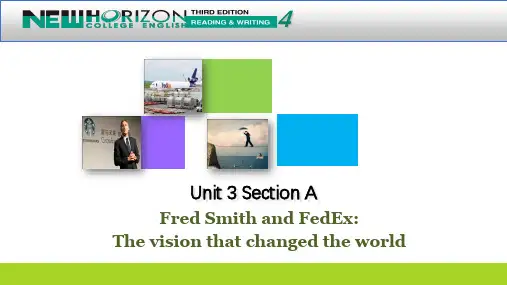
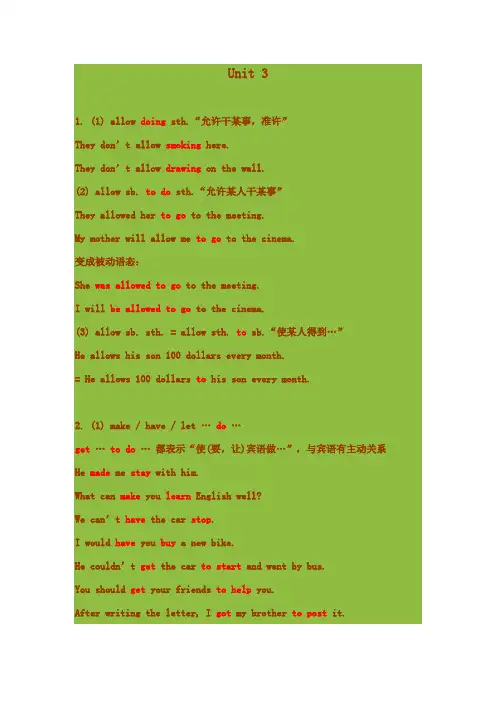
Unit 31. (1) allow doing sth.“允许干某事,准许”They don’t allow smoking here.They don’t allow drawing on the wall.(2) allow sb. to do sth.“允许某人干某事”They allowed her to go to the meeting.My mother will allow me to go to the cinema.变成被动语态:She was allowed to go to the meeting.I will be allowed to go to the cinema.(3) allow sb. sth. = allow sth. to sb.“使某人得到…”He allows his son 100 dollars every month.= He allows 100 dollars to his son every month.2. (1) make / have / let …do…get…to do…都表示“使(要,让)宾语做…”,与宾语有主动关系He made me stay with him.What can make you learn English well?We can’t have the car stop.I would have you buy a new bike.He couldn’t get the car to start and went by bus.You should get your friends to help you.After writing the letter, I got my brother to post it.(2) get / have + 宾语 + 动词过去分词表示“主语使得别人做了某事”与宾语有被动关系I’ll go and get my hair cut (过去分词).My watch is broken; I’ll get it mended.I’ll have my hair cut tomorrow.They have just had their car repaired.(3) 当make用于被动语态中时,不定式必须带toThey made her stay for dinner. (动词原形)She was made to stay for dinner.She was made to wait for hours.3. (1) own形容词“自己的”用在所有格后加强语气I saw it with my own eyes.Please describe this picture in your own words.one’s own + 名词 = 名词+ of one’s own“某人自己的…”This is my own house.= This house is my own.That’s my (own) bike.= That’s a bike of my own.(2) own动词“拥有,所有”Many people own cars now.(3) owner名词“所有者,拥有人,主人”Who is the owner of this house?He used to own this car.= He used to be the owner of this car.(4) oneself表示“某人自己本身”You must look after yourself.(5) on one’s own“独立地,自愿地”I did that thing on my own.4. (1) stop to do sth.“停下手头所做的事去做另一件事”He stopped to have a look at the boy.(2) stop doing sth.“停止做正在做的事”Why did he stop talking?(3) stop sb. from doing…“阻止某人做某事”The workers had to work for hours to stop the ship from going down.(4) can’t stop doing sth. “忍不住…,无法不…”I couldn’t stop laughing when I heard it.5. (1) need to do sth.“需要做某事”Your parents aren’t at home; you need to cook by yourself today. We need to wear cool clothes in summer.注意:This pair of shoes needs mending.(表被动关系)(2) There is no need to thank me.need为不可数名词“需要,必要,缺乏”There is no need to worry about her.There is no need to set off so early.(3) There is no need (for sb.) to do sth.= It is not necessary (for sb.) to do sth.“没有必要…”There is no need to come so early.=It’s not necessary to come so early.There is no need for you to finish the work today.=You don’t have to finish the work today.(4) There is no need of / for…There is no need of / for money.There is no need of / for hurrying.6. (1) so + be / 助动词 / 情态动词 + 主语表示“另一个主语也…”Lucy finished her homework, so did Lily.Li Mei was late. So were you.If you can finish it in time, so can we.If you go to the cinema tonight, so shall I.(从句用一般现在时代替一般将来时)Tom speaks French. So do I. So does his brother.A: I went to the cinema yesterday.B: So did I.(2) Neither / Nor + be / 助动词 / 情态动词 + 主语表示“另一个主语也不…”Bob didn’t come to school yesterday. Neither / Nor did Tom. If you don’t go, neither / nor will I.(3) so + 主语 + be / 助动词 / 情态动词表示“主语确实…”赞成前一种说法He is a clever boy. --- So he is.Tom hopes to be a teacher. --- So he does.7. by + 时间表示“不迟于,到…为止,到…之时”(1) By the end of last year we had planted 3000 trees.(2) We have learned about 1500 English words by now.(3) By this time tomorrow I will have finished the work.8. concentrate“集中(注意力,精神等),专心,全神贯注于…”常与介词on / upon连用I must concentrate on my new job.I can’t concentrate upon my work when I’m hungry.The terrorists concentrated their activities on the big cities. Mike concentrates more on the computer than his studies.9. (1) keep doing sth. “继续做某一相同的动作”之间无停顿,表示状态和动作的持续He kept telling me to be careful on the trip.He kept standing there for an hour without moving.(2) keep on doing sth. “经过一段时间的间隙后继续做同一件事”强调动作的反复He kept on teaching as though nothing had happened.They kept on working in the field, though it was raining.(3) keep … doing sth.“使…处于做某事的状态”I’m sorry to keep you waiting for a long time.The teacher kept him standing there for an hour.(4) keep … from …和keep … from doing …表示“阻止(防止 / 避免)某事的发生或某人做某事” from不可省略I mustn’t keep you from your work.我不该打扰你的工作.I tried to keep him from going out.You should keep your room from getting dirty.10. (1) perform“表演,演出”The tigers performed well at the circus.perform a part in a play(2) perform“执行,履行”I have performed all my duties.11. (1) would like to do sth.would most like to do sth.I’d like to improve my English.What kind of food would you most like to eat?(2) feel like doing sth.= would like to do sth.= want to do sth. “想要做某事”She feels like watching TV.= She would like to watch TV.I want to have a trip to Tibet.(3) want doing sth. “需要干某事”用主动结构表示被动关系My watch wants (needs) mending.12. (1) decide + 名词 / 代词I can’t decide the date of the trip.(2) decide (not) to do sth.They decided to stay here.The girl decided not to be a nurse.decide相当于make up one’s mind“下定决心,打定主意”I’ve made up my mind to go abroad for further study.We have made up our minds that we will never make the same mistake any more.(3) decide + 疑问代词 / 副词 + 动词不定式Have you decided where to go yet?(4) decide + 从句Let’s first decide where we will go next?We decided (that) we didn’t take part in the football match.It’s difficult to decide who is right.13. (1) volunteer动词“自愿,自愿服务”He volunteered to do the work.Jenny volunteered to clean up the classroom.He volunteered for guard duty.(2) volunteer名词“志愿者”Who can have a volunteer to collect the glasses?Any volunteers?14. (1) I wish you success!The meeting was a great success.(2) She succeeded as a teacher.Did he succeed in solving the money problem?(3) The operation(手术) was quite successful.He was successful in his business.(4) Our country has sent up many satellites into space successfully.15. (1) get in the (one’s) way “妨碍”Computer games can get in the way of your schoolwork.The heavy rain got in our way of having the sports meeting.(2) get … out of the (one’s) way “使…不妨碍某人的路”We have to get the stones out of our way.16. (1) 主语(物) + happen + to sb./ sth.“某人(物)发生…”The accident happened this morning.I wondered what had happened to him.What’s happening to the forest?If anything happens to him, let me know.(2) 主语(人) + happen to do sth. “某人碰巧、恰巧做某事”She happened to go / be out when I phoned her.I happened to see him on the street.It happened that I saw him in the reading room.(3) happen强调“事情的偶然性发生”happen --- take place指“经过安排,筹划的有计划发生”The Olympic Games take place every four years.Great changes have taken place in our country.The dance will take place on Saturday night.When will the meeting take place?17. (1) sleep名词和动词“睡觉”He had a good sleep. (名词)Last night I slept very well. (动词)(2) asleep形容词“睡着的”只用作表语The child has been asleep.若表示“睡着的”作定语修饰名词用sleeping 如:the sleeping dog(3) sleepy形容词“困乏的,想睡觉的”I feel very sleepy now.标签: 教学笔记 .。
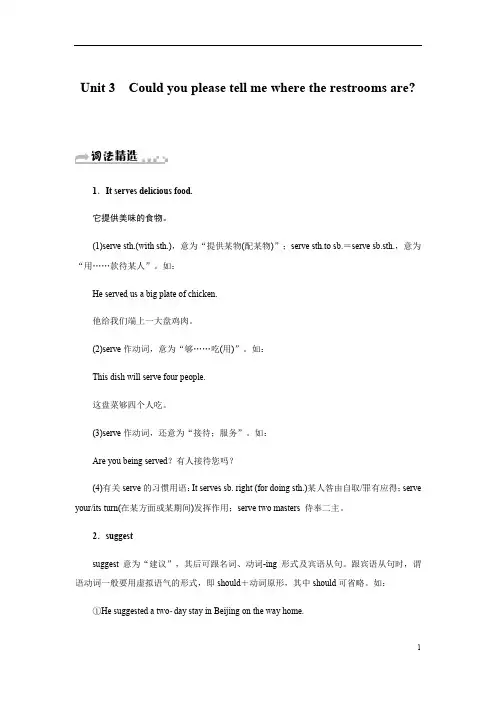
Unit 3Could you please tell me where the restrooms are?1.It serves delicious food.它提供美味的食物。
(1)serve sth.(with sth.),意为“提供某物(配某物)”;serve sth.to sb.=serve sb.sth.,意为“用……款待某人”。
如:He served us a big plate of chicken.他给我们端上一大盘鸡肉。
(2)serve作动词,意为“够……吃(用)”。
如:This dish will serve four people.这盘菜够四个人吃。
(3)serve作动词,还意为“接待;服务”。
如:Are you being served?有人接待您吗?(4)有关serve的习惯用语:It serves sb. right (for doing sth.)某人咎由自取/罪有应得;serve your/its turn(在某方面或某期间)发挥作用;serve two masters 侍奉二主。
2.suggestsuggest意为“建议”,其后可跟名词、动词-ing形式及宾语从句。
跟宾语从句时,谓语动词一般要用虚拟语气的形式,即should+动词原形,其中should可省略。
如:①He suggested a twoday stay in Beijing on the way home.他建议回家途中在北京停留两天。
②My father suggested sending for a doctor at once.我父亲建议马上派人请个医生。
③The teacher suggested that we (should) speak English as much as possible in class.老师建议我们尽可能在课堂上多讲英语。
3.depend on取决于depend on+名词/代词/宾语从句,意为“视……而定;取决于……”。
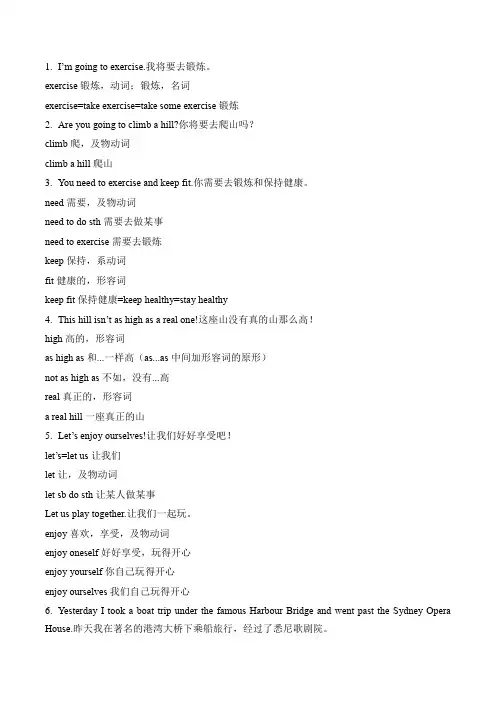
1.I’m going to exercise.我将要去锻炼。
exercise锻炼,动词;锻炼,名词exercise=take exercise=take some exercise锻炼2.Are you going to climb a hill?你将要去爬山吗?climb爬,及物动词climb a hill爬山3.You need to exercise and keep fit.你需要去锻炼和保持健康。
need需要,及物动词need to do sth需要去做某事need to exercise需要去锻炼keep保持,系动词fit健康的,形容词keep fit保持健康=keep healthy=stay healthy4.This hill isn’t as high as a real one!这座山没有真的山那么高!high高的,形容词as high as和...一样高(as...as中间加形容词的原形)not as high as不如,没有...高real真正的,形容词a real hill一座真正的山5.Let’s enjoy ourselves!让我们好好享受吧!let’s=let us让我们let让,及物动词let sb do sth让某人做某事Let us play together.让我们一起玩。
enjoy喜欢,享受,及物动词enjoy oneself好好享受,玩得开心enjoy yourself你自己玩得开心enjoy ourselves我们自己玩得开心6.Yesterday I took a boat trip under the famous Harbour Bridge and went past the Sydney Opera House.昨天我在著名的港湾大桥下乘船旅行,经过了悉尼歌剧院。
trip短途旅行,可数名词take a boat trip乘船旅行under在...的下面under the famous Harbour Bridge在港湾大桥下面go past经过=passthe Sydney Opera House悉尼歌剧院go past the Sydney Opera House=pass the Sydney Opera House经过悉尼歌剧院7.I’m having a great time in Australia!我在澳大利亚玩得很开心!have a great time=have a good time=have a nice time=have a wonderful time玩得很开心8.Take care!保重!care照顾,关怀,名词take care保重take care of...照顾...=look after...take good care of...照顾好=look after...welltake good care of yourself=look after yourself well照顾好你自己9.We’re sitting in a little coffee shop by the River Seine.我们正坐在塞纳河旁边的一个小咖啡馆里面。
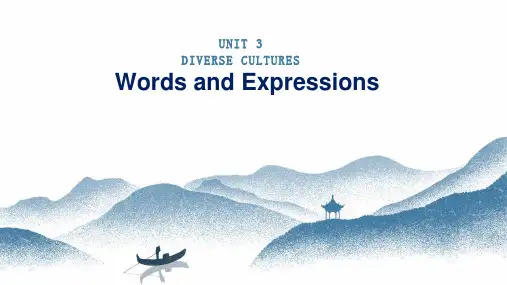
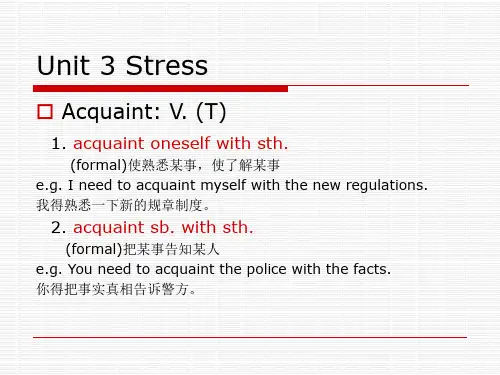

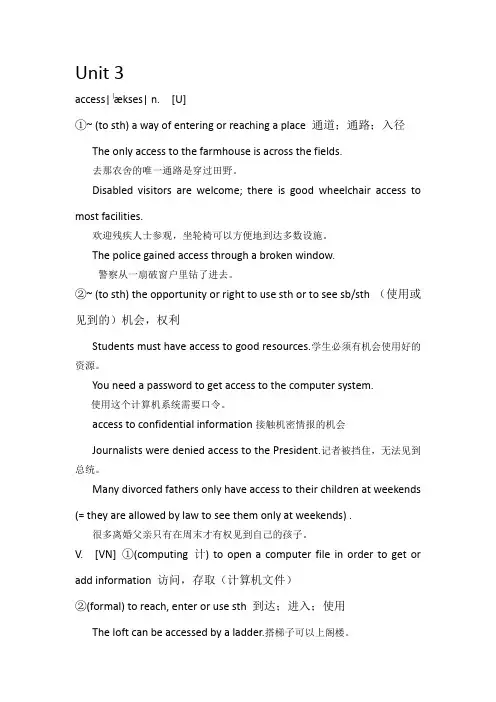
Unit 3access|ˈækses| n. [U]①~ (to sth) a way of entering or reaching a place 通道;通路;入径The only access to the farmhouse is across the fields.去那农舍的唯一通路是穿过田野。
Disabled visitors are welcome; there is good wheelchair access to most facilities.欢迎残疾人士参观,坐轮椅可以方便地到达多数设施。
The police gained access through a broken window.警察从一扇破窗户里钻了进去。
②~ (to sth) the opportunity or right to use sth or to see sb/sth (使用或见到的)机会,权利Students must have access to good resources.学生必须有机会使用好的资源。
You need a password to get access to the computer system.使用这个计算机系统需要口令。
access to confidential information接触机密情报的机会Journalists were denied access to the President.记者被挡住,无法见到总统。
Many divorced fathers only have access to their children at weekends (= they are allowed by law to see them only at weekends) .很多离婚父亲只有在周末才有权见到自己的孩子。
V. [VN] ①(computing 计) to open a computer file in order to get or add information 访问,存取(计算机文件)②(formal) to reach, enter or use sth 到达;进入;使用The loft can be accessed by a ladder.搭梯子可以上阁楼。
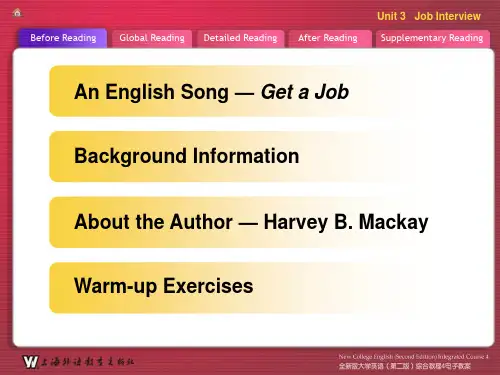
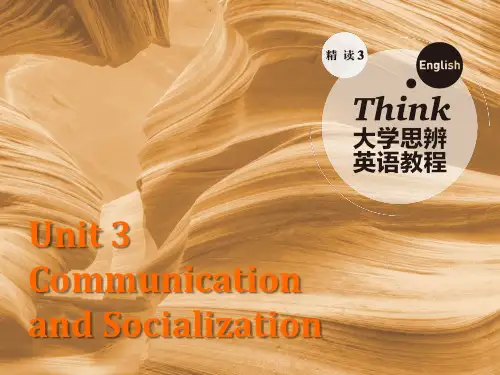
Unit 31.ScriptW: Chinese students are often too shy to say anything in class.M: I think they don’t speak because their culture values modesty,and they don’t want to be showing off. Goes back to Confucius.Q: Why don’t Chinese students say in class according to the man?C) They are modest.2.ScriptW: The government is doing something at last about sex discrimination in the work place. Women deserve the same pay as men for the same work.M: Yeah. In the United States, women earn only 70 percent of what men get for the same job. It’s a situation that has to be changed.Q: What does the man say about the women?A) They earn less than men.3. ScriptW: I admire Michael Dell. He had a dream to be the world’s largest manufacture of personal computers, and he has realized that dream.M: And he dropped out of university to become a success. I wonder if there is a lesson in that.Q: What do we learn about Michael Dell from the dialog?D) He succeeded in his career though he did not complete his education.4. ScriptM: Successful entrepreneurs are often self-made people who have a vision and know where they are going.W: But do they enjoy life like you and me, or is money their only concern?Q: What are the two speakers’ attitudes toward successful entrepreneurs?D) The man admires the entrepreneur but the woman does not.5. ScriptW:Do you agree that equal opportunity for all in an educational system is important?M: Yes, but we have to recognize that all of us are not of equal ability.Q: What does the man imply?A)We should acknowledge differences between students.III. Listening InTask 1: Competition in AmericaScriptAlan: What are you reading, Eliza?Eliza: An article on America competition.Alan: Competition is everywhere. Why so much fuss about it, Miss Knowledge? Eliza:Don’t make fun of me. According to the author, competition is especially important in American life. They’re taught to complete from early childhood.When children play games, they learn how to beat others.Alan: And many girls want to look more attractive than the girls sitting next to them in class. Do you think that way?Eliza: Don’t be silly. Let’s get back to the point. When children are growing up, they complete with one another in their studies.Alan: I sn’t that also true of students in other nations? As we all know, many Asian students would kill for a high test score and grab every opportunity to sharpen their competitive edge over others.Eliza:American boys find great pleasure in competing with each other in sports, according to the author.Alan:I do like sports. When our football team beats the other team, I feel great…makes me want to shout out loud. But isn’t that normal throughout the world? Eliza:American people also compete with each other at work and at climbing the social ladder.Alan: But there’s such competition in other countries as well.Eliza:You’re right in a sense, but the author says the idea of competing is more deeply rooted in the minds of Americans. They’re even taught that if you lose and don’t feel hurt, there must be something wrong with you.Alan: I hear that some Asians put emphasis on cooperation. Which approach do you think makes more sense?Eliza: It’s hard to say. Anyway, it’s just culture difference.Question and key:1.What is the dialog mainly about?C) Varies aspects of American competition.2.What is the woman reading?A) Reading an article on American competition.3.What do children learn from playing games according to the woman?C)Competitiveness.4.What does the man say about Asian and American students?B) Competition exacts among both Asian and American students.5. What does the woman think more sense, competition or cooperation?D) It’s difficult to arrive at a definite conclusion.Task2: Americans’ work ethicScript and keyFor 400 years or more, one thing has been a characteristic of Americans. It is called their“work ethic”. Its (S1) roots were in the teachings of the Christian Puritans who first settled in (S2) what is now the northeastern state of Massachusetts. They believed that it was their (S3) moral duty to work at every task to please God by their (S4) diligence, honesty, attention to details, skill, and attitude. To these Puritans, it was a (S5) sin to be lazy or to do less than your best in any task. They and later Americans tried to follow Bible’s (S6) teachings,“If a man will not work, he shall not eat.”Therefore, American have for (S7) centuries believed that they were guilty of sin if they did not work carefully and hard as they could when they did anything. God would punish those who were careless or lazy in their work. (S8) Even as children they were taught, “If it’s worth doing at all, it’s worth doing well.”But some people have gone beyond the usual sense of diligence. They are especially attracted to the notion of “climbing the ladder”so as to increase their status, financial position, and sense of self-worth.(S9) In English a new word has been created to describe people who work compulsively. The word “workaholic”describes an individual who is as addicted to work as an alcoholic is to alcohol.They are conflicting points of view about workaholics. Those concerned with problems of mental stress believe workaholics abuse themselves physically and mentally. (S10) Others hold that workaholics are valuable members of society because they are extremely productive. The American culture values achievement, efficiency, and production, and a workaholics upholds those values.Task3: Cross-cultural tips on doing businessScriptCountries from around the globe, such as Germany, the U.S., the U.K., and Russia, conduct a lot of business in China-the biggest market in the world. Here are some tips to help you deal more successfully with people from those nations.Firstly, you must be punctual with the Germans. Being even five minutes late makes a poor impression. Being punctual is also very important with Americans and the British. But while it’s important to be on time for business meetings, nobody expects you to be punctual for a social event. Half past seven is really means a quarter to eight, or even eight o’clock! With Russians, always be on time, but don’t be surprised if your Russian contact is very late! It is not unusual for them to be one or even two hours late!In the business environments of those four countries, it is best to wear formal clothes of dark colors. In Russia, designer clothes are rather common. However, don’t be surprised if you go to an office in the U.K., on a Friday and find everyone wearing jeans. Many companies in the U.K. have “dress down Fridays”, when people wear casual attire.In conversation, the British and the Americans love humor and talking about sports. The weather is also a good topic of conversation with the British, but you should avoid political talk. With the Russians, say positive things about their country, and avoid making complaints. The Germans, however, prefer to get straight down to business!Remember that with the Germans, once a deal has been agreed upon, you can’t change it! With the Americans, money is more important than relationships, whereas with Russians it’s important to get to know your contacts well. Also, don’t be surprised if a British meeting seems like a chaos, with everyone participating and giving opinions!Remember these tips and you will be on your way to a successful international career. Question and key:1.What is true of the Americans and the British in term of punctuality?D) They are punctual for business meetings, but less for social events?2.In which country do people have “dress down Fridays”?A) The U.K.3.What can you infer about the Russians from their conversation?D) They are patriotic.4.How can you do business well with the Russians?A) You should know your contacts well.5.What is the speaker’s attitude toward the four nationalities?C) He is neutral to all of them.IV. Speaking OutMODEL 1: Americans glorify individualism.ScriptSusan: John, I was looking for you. Where have you been hiding all morning? John: Well, I caught Professor Brown’s lecture on American individualism. Susan: Oh, how did you find it?John:Enlightening. Americans glorify individualism. They believe (1) individual interests rank above everything else.Susan:Sounds interesting. (2) It’s a sharp contrast to the oriental collectivism Professor Wang talked about last semester.John: But you should know that the individualism in the United States (3)is not necessarily an equivalent for selfishness.Susan: Then what does it mean in the States?John:They believe (4) all values, rights, and duties originate in individuals, so they emphasize individual initiative and independence.Susan:There could be something in that. Of course (5) an oriental countries the interests of the group are more important than anything else.John:So, it’s all the necessary for foreigners to understand American culture, or they can’t hope to understand the importance of privacy in the West. Susan: Maybe that’s the reason nuclear families outnumber extended families in the United States.John:Right on! You’re catching on fast!Susan: Now let me ask you a question.John: Shoot. Go ahead.Susan: (6) Why do Americans cherish individualism more than oriental people? John:I don’t know. Anyway, Professor Brown didn’t say.Susan: One reason might be that American children stop sleeping with their parents at an early age. They learn independence early, so it’s deeply rooted.John:Wow. That’s an intelligent guess!Model2: What do you think are the reasonsfor that difference?ScriptSusan:Do find that people in America often walk faster than people in China?American (1) always seems to be in a hurry.John:It’s hard to come to a definite conclusion. Some Americans walk in a leisurely way, and some Chinese hurry all the time. But on the whole, I think you’re right.Susan: (2) What do you think are the reasons for that difference?John: Americans treasure time. For them, time is tangible. It’s a thing. “Time is money.”You can “spend time”, “waste time”, “save time”. You can even “kill time”!Susan: (3) Does this strong sense of time affect their lifestyle?John:Sure. If you’re 20 minutes late for a business appointment, the other person or persons will be annoyed. They may not trust you anymore.Susan: But as far as I know, English-speaking people may be 15-30 minutes late for a dinner party.John: That’s true. For an informal occasion like that, punctuality is not so important.Also, a boss may keep his employees waiting for a long time.Susan:But if his secretary is late, she’s in trouble. She will probably receive a reprimand.John:How true!Susan: The American worship of time probably (4) let them to create fast food. John: I agree. And (5) globalization shrinks the differences between cultures. Now people everywhere are rushing, and anywhere you go, you find Kentucky Fried Chicken.Susan: But plenty of Chinese are still making appointments saying, “If I am late, wait for me.”John: But with more intercultural, I think (6) the gap will eventually be bridged, and Chinese will be hurrying everywhere.Model3: That’s the secret of their success.ScriptChris: Hey, Sue, how’s the math class going? Are you head of the class?Susan: Are you kidding? There’s a bunch of foreign students in the class-from China somewhere-and (1) they’re on top.Chris:Why do you think so many Chinese students excel in math? It’s been my observation that the Chinese students are usually the best.Susan: In class they don’t say much, but (2) they definitely get the best marks. Chris: I think part of it is their work ethic. (3) They never skip in class, and they pay attention.Susan: One Chinese student in my class (4) did homework each day until the early hours. He never took a break, watched TV, or went out for a beer.Chris: (5) That’s the secret of their success: hard work and diligence.Susan:It’s so unfair. I could probably do better if I worked harder, but that’s no fun. I think learning should be more fun.Chris:Someone with a knowledge of chess would find a chess tournament fascinating. But if you don’t have the knowledge, then you won’t understand the significance of the moves, and you’ll be bored.Susan:So what you’re saying is knowledge requires hard work, and knowledge makes things interesting. I’m not against knowledge; (6) I just want to learn in an interesting way. What’s more, “All work and no play makes Jack a dull boy.“Ⅴlet’s talkInternational Slavery MuseumScriptThe international Slavery Museum has opened at Albert Dock, in Liverpool. Many people travelled from all over the world to celebrate the opening on 23rd of August. The museum is a place of reflection, contemplation and education.It tells the story of the cruel acts of the transatlantic slave trade, the stories of the lives of the millions of Africans people, who were forced from their homelands onto ships that sailed to unknown lands where they were made to work on farms and in mines in harsh conditions without dignity or payment.Liverpool is one of the many British seaports that became very rich from money made transporting goods such as cotton and sugar, produced by African slaves.One of the most important parts of the museum’s exhibits are the stories of the lives of people who live all over the world today, whose family history can be traced to the Africans whose lives were changed forever by the transatlantic slave trade.It has taken four years of the hard work and planning to organise the creation of the museum, and its opening year is a very significant date because in 2007 we commemorate the 200th anniversary of the Abolition of the Slave Trade Act.This was a law made in 1807; it banned all British people from taking part in the slave trade. Later in 1833 all people who had been forced into slavery to work for British companies were freed.Key:1.It tells the story of the cruel acts of the (1) transatlantic slave trade, the stories ofthe lives of the millions of African people, who were forced from their homelands onto ships that sailed to (2) unknown lands where they were made to work on farms and in mines in harsh conditions without (3) dignity or payments.2.Liverpool is one of the many British seaports that became very (1) rich from manymade transporting goods such as (2) cottons and sugar, produced by African slaves.3.One of the most important parts of the museum’s exhibits are the stories of thelives of people who live (1) all over the world today, whose (2) family history can be traced to the Africans whose lives were (3) changed forever by the transatlantic slave trade.4.Because 2007 marks the 200th anniversary of the Abolition of the Slave Trade Act.5. A law made in 1807; it (1) banned all British people from (2) taking part in theslave trade. Later in 1833 all people who had been forced into (3) slavery to workfor British companies were (4) freed.ⅥFurther listening and speakingListeningTask1 PunctualityScriptTo Americans, punctuality is a way of respect for other people’s time. Being more than 10 minutes late to an appointment usually calls for an apology and maybe an explanation. People who are running late often call ahead to let others know of the delay. Of course, the less formal the situation, the less important it is to be exactly on time. At informal get-togethers, for example, people can arrive as much as 30 minutes past the appointed time. But they usually don’t try that at work.American lifestyles show how much people respect the time of others. When people plan an event, they often set the time days or weeks in advance. Once the time is fixed, it takes almost an emergency to change it. If people want to come to your house for a friendly visit, they will usually call first to make sure it is convenient. Only very close friend will just “dropped in”unannounced. Also, people hesitate to call others late at night for fear they might already be in bed. The time may vary, but most people think twice about calling after 10:00p.m.To outsiders, Americans seem tied to the clock. People in some Eastern cultures value relationships more than schedules. In these societies, people don’t try to control time, but to experience it. Many Eastern cultures, for example, view time as a cycle. The rhythm of nature- from the passing of seasons to the monthly cycle of the moon-shapes their view of events. If they have wasted some time or let an opportunity pass by, they are not very worried, knowing that more time and opportunities will come in the next cycle. But Americans often want to jump at the first opportunity. They are unwilling to stand by idly and give up the opportunity.The early American hero Benjamin Franklin expressed that view of time like this: “Do you love life? Then do not waste time, for that is the stuff life is made of.”Question and key:1.When people are running late in America, what do they do?C) They call ahead to inform others of their delays.2.What do Americans do after the time for an appointment is fixed?B) They change it only when there is an emergency.3.How do people in Eastern cultures view relationships and schedules?A) Relationships are more important than schedules.4.Why aren’t some Eastern people worried if they let an opportunity pass by?C) Another opportunity will come in next cycle.5.What was Benjamin Franklin’s view of time?D) It is part of life.Task2: Our personal spaceScriptOur personal space, that piece of the universe we occupy and call our own, is contained within an invisible boundary surrounding our body. As the owners of this area, we usually decide who may enter and who may not. When our space is invaded, we react in a variety of ways. We back up and retreat, stand our ground as our hands become moist from nervousness, or sometimes even react violently. Our response shows not only our unique personality, but also our cultural background.For example, cultures that stress individualism such as England, the United States, Germany, and Australia, generally demand more space than collective cultures do, and tend to aggressive when their space is invaded. The idea of space is quite different from the one found in the Mexican and Arab cultures. In Mexico, the physical distance between people when engaged in conversation is closer than what is usual north of the border. And for Middle Easterners, typical Arab conversations are at close arrange. Closeness cannot be avoided.As is the case with most of our behavior, our use of space is directly linked to the value system of our culture. In some Asian cultures, for example, employees do not stand near their bosses; the extended distance demonstrates respect. Extra interpersonal distance is also part of the cultural experience of the people of Scotland and Sweden, for whom it reflects privacy. And in Germany, private space is scared. Key:1.T2. F3.T4. F5. FTask3: We don’t know what to do with them.ScriptA Russian, a Cuban, an American businessman, and an American lawyer were passengers on a fast train speeding across the French countryside. As time wore on, they gradually became friendly with one another, introducing themselves and shaking hands. Eventually, the Russian took out a large bottle of vodka and poured each of his traveling companions a drink. Just as the American businessman was sipping the vodka and praising its fine quality, the Russian hurled the half-full bottle out of the open window.“What did you do that for?”asked the startled American businessman.“V odka is plentiful in my country,”said the Russian. “In fact, we have thousands and thousands of liters of it-far more than we need.”The American businessman shook his head and leaned in his seat, obviously baffled by the Russian’s reasoning .A little later, the young Cuban passed around a box of fine Havana cigars. The men enjoyed this treat and made admiring remarks about the pleasure of smoking good Havana cigars. At that very moment the Cuban took a couple of puffs of his cigar and then tossed it out of the open window.“I thought the Cuban economy was not good this year,” the American businessman said,“Yet you threw that perfectly good cigar away. I find your actions quite puzzling.”“Cigars,” the Cuban replied, “are a dime a dozen in Cuba. We have more of them than we know what to do with.”The American businessman sat in silence for moment. Then he got up, grabbed the lawyer, and threw him out of the window.Key:1.The Russian hurled the half-full bottle of vodka out of the open window.2.He answered, “V odka is plentiful in my country. In fact, we have thousands andthousands of liters of it-far more we need.”3.The businessman said, “I thought the Cuban economy was not good this year. Yetyou threw that perfectly good cigar away. I find your actions quite puzzling. ”4.He replied, “Cigars are a dime a dozen in Cuba. We have more of them than weknow what to do with.”5.The American businessman sat in silence for moment. Then he got up, grabbedthe lawyer, and threw him out of the window. He did that probably because hethought there were too many lawyers in the United States.Viewing and speakingReviving the image of tea1.Script and keyVoice-over: Walk down any high street and you can’t help noticing the explosion of trendy coffee shops. The old style of cafes are gradually (1) disappearingto make way for the caffeine culture. As people become espresso fiendsand cappuccino connoisseurs, designer coffees are (2) kicking thetraditional British beverage-tea-off the menu. But there are still a fewoases of calm.[On-screen text: Charlotte Grindling.]Voice-over:Charlotte Grindling is a design guru and a tea fanatic.Charlotte:I’ll have a pot of house blend please.Waitress:OK, and a cream.Charlotte:Yes, thank you. Here we are in a quintessentially English (3) tea shop. I love these places. Look, they even give you a doily. But the problem isthat tea is undergoing an (4) image crisis. You think of your granny, teaat four, the flat cap. But with the explosion of the new coffee shopshitting the high street, the question is: How is tea going to (5) update itsimage?Voice-over:One tea manufacturing company saw a niche in the market for a chain of tea shops to (6) compete with the American-style coffee shops thatdominate the high street. But to compete successfully, they needed a teamachine that made quality tea as (7) fast as the coffee machines makecoffee. They turned to the company Design Bridge for help.David: I’m David.Richard:I’m Richard.David:We work for Design Bridge.Richard:And we design things like that.David:And that.Richard:And that.David:Yeah, and that.Richard: And this one.David:In fact, all of these.Voice-over:David and Richard are (8) product designers.They’re responsible for repackaging many familiar high street brands. Repackaging tea was justone of their briefs and it was because of the (9) contacts that they madewith the tea company that they got the job of designing the tea machine. [On-screen text: David Helps.]David:we met up with our client in a place (10) similar to this, and he said he wanted a tea machine to fit into a load of tea shops he was launching theyear after. So he all spun around and looked at that, and said actually Ithink that’s the sort of thing we (11) want.[On-screen text: Richard Rees.]Richard:The trouble is there it’s a beautiful coffee machine. It’s been around for 30 years, it’s got this gorgeous Italian styling: lots of chrome, lots ofstainless steel, but we weren’t sure whether that style was what weneeded for a tea machine. So that was our (12challenge: What’s the rightstyle for a new tea machine?Voice-over:Faced with creating a new product from scratch, David and Richard would need a design brief. The brief is crucial because they need toknow about the (13) consumer before they can design the product. Thereis a (14) traditional way of finding out what the consumer wants andcreating this design brief.。
Alleviate /☜●♓♓♏♓♦ ♦ 减轻,缓和Almanac ●❍☜⏹✌ ⏹ 年历;历书Devastate ♎♏☜♦♦♏♓♦ 毁灭=destroy completelyCyclic / ♦♋✋●✋/ adj. 循环的Oceanographer / ☜☺☞✋☜♊⏹♈❒☜♐☜☎❒✆/ n. 海洋学家Depletive ♎♓☐●♓♦♓ ♋♎ 使干涸的 deplete v. 使衰竭;耗尽Ripple / ❒♓☐● ⏹ 波纹,涟漪V.起波纹The coastguard 海岸警卫队;水警Lens n.透镜,镜头Microfilm 缩微交卷;缩微胶片Part ITake its grip 采取控制AlleviateSnow flurry / ♐●✈❒♓ n. 阵雪;小雪AlmanacClimate zone 气候带Cyclone / ♦♋♓●☜◆⏹/ n. 气旋[气象术语]Hurricane / ♒✈❒♓☜⏹/ n. 飓风Tremendous /♦❒♓❍♏⏹♎☜♦/ 巨大的Potentially adv. 潜在地;可能地Part IIDevastate vt. 毁坏OceanographerRadar / ❒♏♓♎☜/ 雷达RippleCyclicIn a row adv. 连续Unseasonably /✈⏹♦♓⏹☜♌●/ 不合时宜地DepletivePart IIIDivorce from = separate fromObservatory /☜♌☜☜♦☜❒♓/ n.天文台,天文观测站,气象台Silicon Valley 硅谷Eucalyptus tree / ◆☜●♓☐♦☜♦/ n. 桉树Seismographic ♦♋♓❍☜♈❒✌♐♓ station 地震局Dome /♎☜◆❍/ 圆屋顶Real estate /♓♦♦♏♓♦/ n.房地产LensNostalgia /⏹♦♦✌●♎✞♓☜ ⏹思家病 乡愁 怀旧之情 adj. nostalgic =homesickTrade-off 权衡;协调There is a trade-off between the benefits of the drug and the risk of side effects.In motion 在运转中set/put sth. in motion 让。
《全新版大学进阶英语综合教程3》课程单元教学设计(教案)编号:U3-01Steps(步骤)教学组织Step One(步骤一)Opener:Pair work: The pictures below compare Westerners (marked in blue) andChinese (marked in pink) in their way of looking at children and the family,travelling, and the role of the boss in an organization. Look at the picturesand work with your partner to answer the questions that follow.Helpful Expressions接送孩子drop off and pick up the child风土人情local customs and culture到此一游been here, done that高高在上superiority有权有势powerfulQuestions:1 In what way does the role of grandparents in Chinese families differ fromthat in Western families2 In what way do Western tourists and Chinese tourists behave differently3 In what way do Western and Chinese employees differ in the way they lookupon their bossTips in this part:1. Introduce the topic to the class by asking if they can give any example ofhow Chinese and non-Chinese behave or think differently in life.2. Explain the pictures in Opener that illustrate the differences between theWesterners and Chinese in their perspective on different issues.3. Ask Ss to look at the pictures and discuss the differences in pairs with theaid of the questions that follow.4. To sum up, have different pairs report to the class their discussion on thepictures, one pair for one picture.Step Two(步骤二)Video watching:After watching a video clip about an interview with three foreign womenmarrying Chinese husbands, discuss the following questions with yourpartner.1. According to the video, when raising grandchildren, what is the difference《全新版大学进阶英语综合教程3》课程单元教学设计(教案)编号:U3-02《全新版大学进阶英语综合教程3》课程单元教学设计(教案)编号:U3-03《新视野大学英语(第三版)》Book 3课程单元教学设计(教案)编号:U3-04DiscussionDiscuss what you like / dislike about where you live.things you like:a food market; a bookstore; close to the metro; a good hospital / medical care centerthings that are nice but not essentiala good local supermarket; a sports center;a theater / cinema; a barthings you dislike:lacking of parking space; various types of noise; pollution; high crime rateThink about your neighborhood. What would make it:saferLectures should be given to tell people how to prevent fire, theft and other dangers. Besides, the police should make sure the streets are safe –not only from crime but also from traffic accidents.more beautifulI think we should plant more trees and flowers in the community. In addition, we should discipline our own behavior and should not litter garbage everywhere or draw on the buildings.more interestingMore entertainment activities should be held to draw the interest of people. Meanwhile, don’t forget the children. We should also provide them with facilities to give them fun and joy.better for your healthI think we should build a community gym providing a variety of affordable exercise options. Besides, activities should be conducted to help people quit smoking or excessive drinking.more of a communityI’d really like to see a good shopping mall, where people can meet, get to know each other and entertain themselves.。
大学英语综合教程U n i t3参考答案-CAL-FENGHAI.-(YICAI)-Company One1Key to Unit 3Text A Public Attitudes Toward Science课前预习Directions: Read the text and find out the English versions for the following expressions.1.享有特权的少数人 a privileged minority (Para.1, L.6)2.大多数民众the vast minority of population (Para.1,L.8)3.将时钟拨回到从前put the clock back to an earlier age (Para.2, L.1)4.阻止未来的进一步发展 prevent further advances in the future (Para.2, L.3)5.带来技术的发展bring about advances in technology (Para.2, L.6)6.压制新生事物suppress anything new (Para.2, L.10)7.人的积极极性和创造力 human initiative and inventiveness (Para.2, L.10)8.延缓变化的速度slow down the rate of change (Para.2, L.12)9.确保方向正确的变化ensure the changes in the right direction (Para.3,L.2)10.在一个民主社会in a democratic society (Para.3, L.3)11.做出明智的决定make informed decisions (Para.3, L.5)12.对科学抱着矛盾的态度 be in two minds about science (Para.3, L.7)13.生活水平的稳步提高the steady increase in the standard of living (Para.3, L.8)14.科幻小说science fiction (Para.3, L.17)15.利用这种兴趣harness this interest (Para.4, L.1)16.以一种枯燥乏味的方式 in a dry and uninteresting manner (Para.4, L.6)17.认识其与世界的联系see its relevance to the world (Para.4, L.7)18.通俗读物popular books (Para.4, L.11)19.倾向于做某事tend to do sth. (Para.5, L.1)20.科学概念scientific concepts (Para.5, L.4)21.用文字和图表表述convey sth. by words and diagrams (Para.5, L.4)22.提供基本框架provide the basic framework (Para.6, L.1)23.阐明新的发展put across new developments (Para.6, L.8)24.小部分人 a small proportion of the population (Para.6, L.10)25.科学奇迹scientific wonders (Para.6, L.12)26.负有教育民众的重任have a responsibility to educate the public (Para.6, L.16)27.娱乐民众entertain the public (Para.6, L.16)28.危机四伏be filled with dangers (Para.7, L.1)29.接触外星文明contact an alien civilization (Para.7, L.2)30.充分相信have sufficient faith in sth. (Para.7, L.4)巩固应用I. Directions: Now you’ve learned Text A in detail. Let’s check how much you’ve learned from it! Please translate the Chinese expressions in the following sentences into English. Be sure you use expressions from the text.1.Whether you believe it or not (信不信由你),we were left waiting in the rainfor two hours.(Para.1, L.1)2.We saw /viewed this event as a turning point (把这件事看作是一个转折点).(Para.1, L.4)3.I can’t afford a car, so I guess I will have to do without (就只好不用了) . (Para.1,L.7)4.Forget all about it and look to the future; you can’t put the clock back (让时光倒流). (Para.2, L.1)5.He can’t see, nor could he hear (他还听不见) until a month ago. (Para.2, L.3)6.I have come to realize (逐渐意识到) that what I have done is misguided.(Para.3,L.7)7.As was mentioned in my last letter (正如上封信中所提到的),I’ll be back inOhio in June. (Para.3, L.15)8.I am wearing twice as much as I usually do (是平时穿的两倍) because of thecold weather. (Para.4, L.14)ter, I’ll prove what you say wrong (证明你所说的是错的). (Para.7, L.5)II. Language FocusEx. I. Translate the following English expressions into Chinese and Chinese into English.1.The line of products will be highly profitable.这个行业的产品将十分有利可图(P.67-I-3-3)2.regain health 恢复健康 (P.68-II-1)3.the right attitude towards science 对科学的正确态度 (P69-Cloze 1- L.1)4.the proportion of the population that………人口的比例 (P.69-Cloze 1-L.9)5.make discoveries that have practical value 做出具有实际应用价值的发现(P.69-Cloze 2- L.5)6. a glass wire 光纤 (P.70-Cloze2-L.7)7.endless number of new discoveries 无穷无尽的新发现(P.70-Cloze 2- L.10)8.in a space station in orbit around the earth 在一个围绕地球轨道运行的空间站(P.70-Cloze 2- L.17)9.扔掉这些旧椅子get rid of these old chairs(P.66-I-1-5)10.及时的帮助timely help (P.66-I-1-9)11.做出精确的预言make accuratepredictions (P.67- I-3-3)12.对……迟疑不决be undecided about(P.68- II-2)13.山区the mountainousregion (P.68-II-3)14.缺少,不足be undersuppliedwith (P.68- II-3)15.提出……的要求作为demand... as… (P.68-II-5)16.在做某事上有困难have difficulty (in) doingsth. (P.68-II-7)17.总的来说on balance (P.69-III-2-4)18.优点多于缺点Strengths outweighweaknesses. (P.69-III-2-4)19.对……怀疑be distrustful ofsth. (P.69-Cloze 1-L.2)Ex. II. Please translate the Chinese expressions in the following sentences into English. Be sure to use expressions from the exercises.1.As pace of life quickens (随着生活的节奏加快), things tend to change fast in thecity. (P.66-I-1-4)2.The decision on the new project is made on the basis of scientific study (在科学研究的基础之上). (P.67-I-3-2)3.We have succeeded because we had the foresight to invest in new technology(投资于新技术的先见之明). (P.68-II-6)4.Only a minority of people support military action. The majority are for a peacefulsolution (赞成和平解决). (P.69-III-2-1)5.Applicants who meet our job requirements (符合我们的工作要求) are accepted,those who fall short (不符合条件的) are rejected. (P.69-III-2-2)6.As is shown by history (正如历史所表明的), local clashes may lead to a globalwar. (P.69-III-2-5)III. Language EnhancementEx. I. Translate the following Chinese sentences into English.1. 无论你是否相信,我们的家乡在过去的十年间发生了许多变化,而且在未来的十年里变化会更多。
新 疆 医 科 大 学 教 案 首 页 编号:11-12-1-ER-2-03
课程名称 College English II 专业 Various Majors 班级 2010-2A4&A1厚博口腔/药学/影像/临床
主讲教师 Sun Peng 计划时数 2×6 (classes) 专业层次 Under-graduates 专业技术 职 称 Teaching Assistant 编写时间 Aug.25, 2011
章节名称 Unit 3 Love & Marriage 使用时间 Sept. 20, 2011 教学目的 与 要 求
1. help students enlarge their lexical accumulation
2. help students better understand difficult sentences 3. help students do C-E translation & E-C translation 4. help students practice writing
重点与难点
1. key lexical accumulation: gracious, swear sb. to secrecy, reluctant, bounce, 2. Grammar focus: with或without+复合结构
教学内容 更新情况 Complementary translation work
Complementary knowledge of difficult grammatical structure Complementary writing practice on the basis of the reading practice
教学方法 与 组织安排
Teaching method: Communicative and interactive teaching approach will be employed Time Allotment 1st period: lead-in and comprehension of in-depth reading 1 2nd period: practice of the translation work and writing
教学手段 Teaching materials and other related materials and books Computer-based & Student-centered
基本教材 和参考书
1. College English II
2. Longman Dictionary Of Contemporary English. 3. On-line materials
集体备课
教 研 室 审查意见 Unit 3 Love and Marriage Teaching objectives: Students are helped to achieve the following aims through the learning of Unit 3 1. help students enlarge their lexical accumulation 2. help students better understand difficult sentences 3. help students do C-E translation & E-C translation 4. help students practice writing Teaching focus: 1. key lexical accumulation: gracious, swear sb. to secrecy, reluctant, bounce, participate, schedule 2. Grammar focus: with或without+复合结构 Teaching steps: This unit will be conducted within two teaching periods and each period of teaching will be on one central topic. Period 1: Passage 1 Reading in Depth (50 minutes) Step 1: Titles reading and texts understanding (10 minutes) Step 2: Lexical Chunks Accumulation in Reading 1 (10 minutes) (Key Point) Step 3: Difficult sentences understanding and translation in Reading 1 (20minutes) (Difficult Point) Step 4: Summary on with structure (10 minutes) (Difficult Point)
Period 2: Reading comprehension of Reading 2 and writing practice (50 minutes) Step 1: Reading comprehension check of Reading 2(30 minutes) Step 2: Exercises of sentence translation (15 minutes) (Key & Difficult Point) Step 3: Homework on writing (5 minutes)
Comments on this unit Detailed Teaching Plan of Unit 3 Love and Marriage Period 1: Passage 1 Reading in Depth (50 minutes) Step 1: Titles reading and texts understanding (10 minutes) The teacher asks students to browse the titles of 5 reading in this unit and help them to predict each reading for a general understanding of this unit. The titles are presented as follows: 1. A Surprise Gift for Mother 2. Marriages Improve After Children Fly the Coop 3. The Difference Between Loving and Being in Love 4. Mastering the Fundamentals for Marriage 5. Mother’s Day
Step 2: Lexical Chunks Accumulation in Reading 1 (10 minutes) (Key Point) The teacher asks students to finish the following vocabulary work to help them enlarge their vocabulary and better their reading comprehension. A. Find the English translation of the following Chinese expressions: 喉咙哽咽 feel a catch in the throat 不情愿做 be reluctant to do 使某人誓守秘密 swear a person to secrecy 深度昏迷的状态 a state of deep unconsciousness 从坐椅上一跃而起 bounce out of chair
B. Translate the following into Chinese pick up the receiver 拿起听筒 gracious hostess 亲切的女主人 in my father’s absence 我父亲缺席,不在场 finishing touches 最后的几笔 to my astonishment 让我吃惊的是 smile broadly 咧嘴笑,眉开眼笑
Step 3: Difficult sentences understanding and translation in Reading 1 (20minutes) (Difficult Point) Put the following sentences into Chinese and pay attention to their grammatical structure. 1. The smells of roasted turkey, Southern Baked ham and home-made bread hung in the air. 2. All the joys of a close family relationship radiated throughout our parents’ home. 3. With a tear escaping down one cheek, he mumbled.